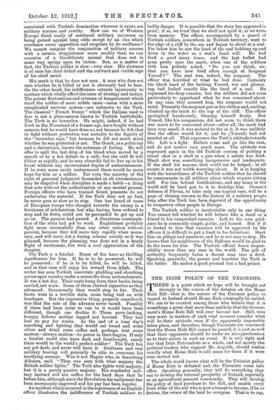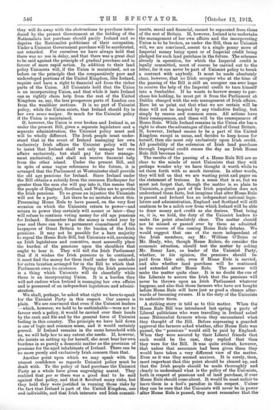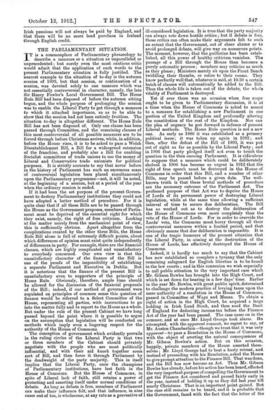THE IRISH POLICY OF THE UNIONISTS.
THERE is a point which we hope will be brought out strongly in the course of the debates on the Home Rule Bill—that is, the nature of the Unionist policy in regard to Ireland should Home Rule eventually be carried. We are to be counted among those who believe that it is something a great deal more than unlikely that the Govern- ment's Home Rule Bill will ever become law. Still, wise men must in matters of such vital moment consider what will be their attitude even if the apparently impossible takes place, and therefore, though Unionists are convinced that the Home Rule Bill cannot be passed, it is just as well that their opponents should be under no misapprehension as to their action in such an event. It is only right and fair that Irish Nationalists as a whole, and not merely the political traders who support Mr. Asquith, should realize exactly what Home Rule would mean for them if it were ever carried out.
The whole world knows what will be the Unionist policy if Home Rule is defeated and the Unionists come into office. Speaking generally, they will do everything they can to develop the internal prosperity of Ireland, especially as an agricultural peasant community. They will develop the policy of land purchase to the full, and enable every Irish tiller of the soil who is now a tenant to become, if he so desires, the owner of the land he occupies. That is to say, they will do away with the obstructions to purchase intro- duced by the present Government at the bidding of the Nationalists lest purchase should pacify Ireland and so deprive the Nationalist politicians of their occupation. Under a Unionist Government purchase will be accelerated, not retarded. For ourselves we have always held that there was no use in delay, and that there was a great deal to be said against the principle of gradual purchase and in favour of more rapid action. In addition to their land policy Unionists will, if the Union is maintained, act as before on the principle that the comparatively poor and undeveloped portions of the United Kingdom, like Ireland, require and have a right to financial aid from the richer parts of the Union. All Unionists bold that the Union is an incorporating Union, and that while it lasts Ireland can as rightly claim help from the rest of the United Kingdom as, say, the less prosperous parts of London can from the wealthier sections. It is no part of Unionist policy, while the Union exists, that Ireland should fry in her own sauce maigre. So much for the Unionist policy if the Union is maintained.
If, however, the Union is ever broken and Ireland is, as under the present Bill, given a separate legislature and a separate administration, the Unionist policy must and will be wholly different. The Irish people must under- stand that in the event of Ireland managing her own exclusively Irish affairs the Unionist policy will be to insist that Ireland shall not only manage her own affairs exclusively, but shall pay for their manage- ment exclusively, and shall not receive financial help from the other island. Under the present Bill, and in spite of some vague references to the future, it is arranged that the Parliament at Westminster shall provide the old age pensions for Ireland. Since Ireland under the Bill obtains a subsidy from the common Exchequer far greater than the sum she will pay into it, this means that the people of England, Scotland, and Wales are to provide the Irish pensions. To so gross an injustice the Unionists will not be a party. Let there be no mistake about this. Presuming Home Rule to have passed, on the very first occasion on which the Unionists return to power—and return to power they certainly will sooner or later—they will refuse to continue voting money for old age pensions for Ireland. Remember that the money is voted year by year and there can be no permanent commitment of the taxpayers of Great Britain to the burden of the Irish pensions. It may not be possible for a bare majority to repeal the Home Rule Bill, but Unionists will, assuming an Irish legislature and executive, most assuredly place the burden of the pensions -upon the shoulders that ought to bear it. They will tell the Irish Parliament that if it wishes the Irish pensions to be continued, it must find the money for them itself under the methods for extra taxation arranged for in the Bill to which that Parliament owes its existence. Paying the Irish pensions is a thing which Unionists will do cheerfully while there is an incorporating Union. It is a burden they will not endure when Ireland is managing her own affairs and is possessed of an independent legislature and admini- stration.
We shall, perhaps, be asked what right we have to speak for the Unionist Party in this respect. Our answer is plain. We are convinced that even if the Unionist leaders —which, however, we hold to be unthinkable—were not to favour such a policy, it would be carried over their heads by the rank and file and by the general force of Unionist feeling in this country. The principle we have laid down is one of logic and common sense, and it would certainly prevail. If Ireland remains in the same household with us, we will help her to any extent she needs. If, however, she insists on setting up for herself, she must bear her own burdens in so purely a domestic matter as the provision of pensions for the aged inhabitants of Ireland. There can be no more purely and exclusively Irish concern than that.
Another point upon which we may speak with the utmost confidence as regards Unionist policy must be dealt with. To the policy of land purchase the Unionist Party as a whole have given ungrudging assent. They realized that per se there was a good deal to be said against that policy, and that it Involved many risks, but they held they were justified in running those risks by the fact that Ireland is part of the United Kingdom, one and indivisible, and that Irish interests and Irish commit- ments, moral and financial, cannot be separated from those of the rest of Britain. If, however, Ireland is to undertake the management of her own affairs and the incorporating Union is to be broken, as under the Bill, then no Unionist will, we are convinced, assent to a single penny more of Imperial money being spent or of Imperial credit being pledged for such land purchase in the future. The schemes already in operation, for which the Imperial credit is legally committed, must of course be carried out to the letter, for it can never be part of Unionist policy to break a contract with anybody. It must be made absolutely clear, however, that no Irish occupier who at the time of the passing of the Bill is still an occupier can ever hope to receive the help of the Imperial credit to turn himself into a freeholder. If he wants to borrow money to pur- chase his holding, he must get it from the Parliament at Dublin charged with the sole management of Irish affairs. Here let us point out that what we are certain will be done will not be inspired by any vindictive feeling, but simply by reason and common sense. All actions have their consequences, and these will be the consequences of Home Rule. While Ireland remains in the Union she has a. right to share the advantages of the credit of Great Britain. If, however, Ireland. ceases to be a part of the United Kingdom except in name, and decides to keep house for herself, then she must rely exclusively upon Irish credit.. All possibility of the extension of Irish land purchase through Imperial credit ceases the day an Irish Homo Rule Bill becomes law.
The results of the passing of a Home Rule Bill are so clear to the minds of most Unionists that they will perhaps wonder why we have thought it worth while to set them forth with so much iteration. In other words, they will tell us that we are wasting print and paper on the statement of truisms. In a sense that is so, but we must not forget that, though the matter is so plain to Unionists, a. great part of the Irish population does not understand these facts, but imagines that after Home Rule is passed and Ireland has an independent national leois- lature and administration, England and Scotland will still continue to be a milch cow from which Ireland will be able to draw money and credit as she desires. That being so, it is, we hold, the duty of the Unionist leaders to make the point absolutely clear. The matter should not be missed or passed over by them as admitted in the course of the coming Home Rule debates. We would suggest that one of the more independent of the Irish members, say Mr. William O'Brien or Mr. Healy, who, though Home Rulers, do consider the economic situation, should test the matter by asking Mr. Bonar Law, as leader of the Unionist Party,. whether, in his opinion, the pensions should be paid from this side, even if Home Rule is carried, and also whether land purchase will be continued and extended after Home Rule. The answer will make the matter quite clear. It is no doubt the cue of the Liberals to assure the Irish that the pensions will never be thrown upon an Irish Parliament whatever happens, and also that those farmers who have not bought before Home Rule will have just as good a chance after- wards of becoming owners. It is the duty of the Unionists to undeceive them.
A striking story is told as to this matter. 'When the Home Rule Bill was introduced last spring a party of- 'Liberal politicians who were travelling in Ireland asked some Nationalist farmers whom they encountered what they thought of the Bill. Before expressing a guarded approval the farmers asked whether, after Home Rule was passed, the " pensions " would still be paid by England. When they were assured by their Liberal friends that such would be the case, they replied. that then they were for the Bill. It was quite evident, however, that unless that assurance had been given them they would have taken a very different view of the matter. Even as it was they seemed anxious. It is surely, then, most important that this point should be cleared up, and. that the Irish people should be made thoroughly and clearly to understand what is the policy of the Unionists, both in respect of pensions and of land purchase, if ever Home Rule should come about. It would be most unfair to leave them in a fool's paradise in this respect.' Unlessi they can be sure that the Unionists will never be in power after Home Rule is passed, they must remember that the Irish pensions will not always be paid by England, and that there will be no more land purchase in Ireland through English credit.












































 Previous page
Previous page